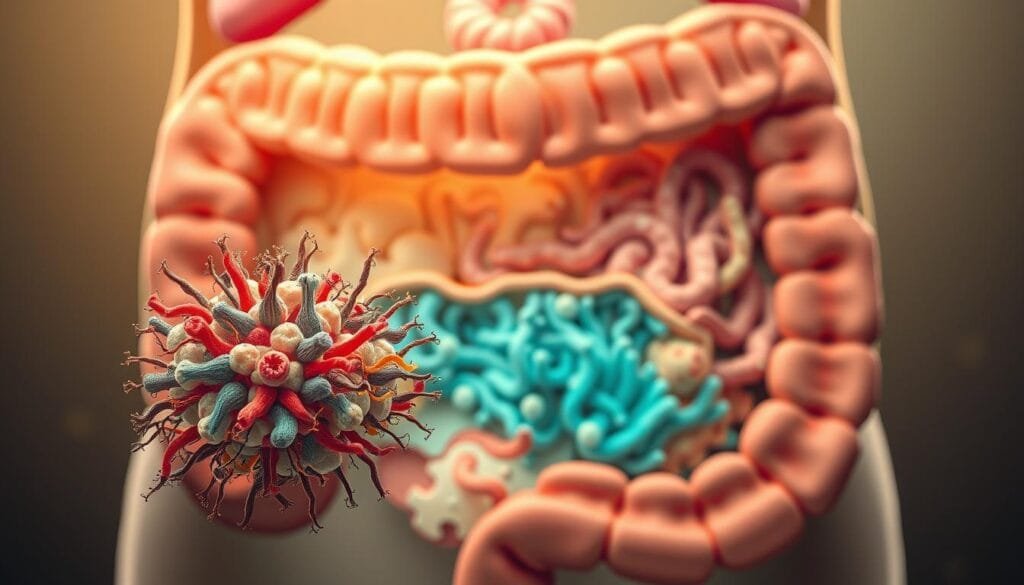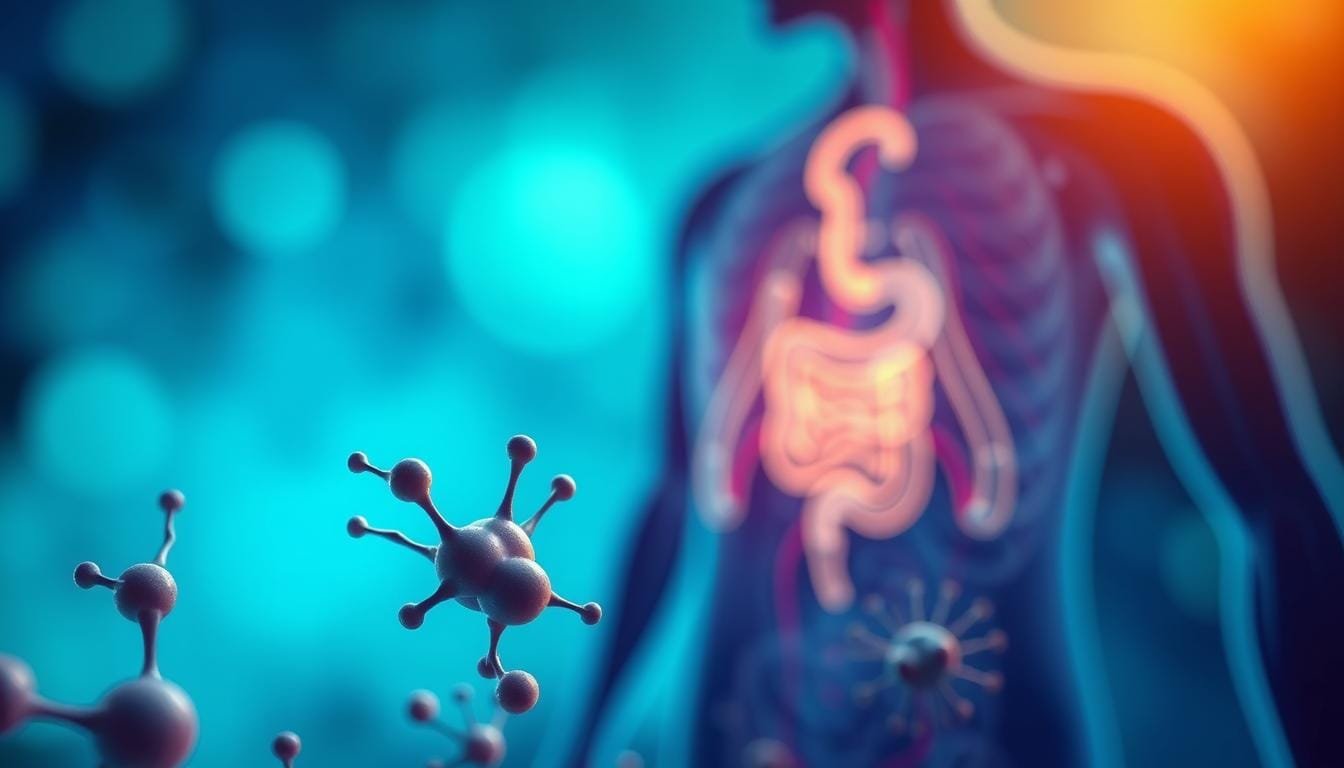Currently Empty: RM0.00
Trillions of microorganisms work daily to keep your body healthy, and certain strains play a special role in maintaining wellness. These live bacteria, often called “good” microbes, interact directly with your gut and other systems to influence how your body responds to threats.
Research shows these microorganisms help balance immune responses by communicating with protective cells. They produce compounds that strengthen gut barriers while training your body to recognize harmful invaders. This relationship explains why 70% of immune cells reside in the digestive tract.
Modern lifestyles sometimes disrupt natural bacterial balances. Factors like stress, processed foods, or antibiotics can reduce populations of helpful microbes. Replenishing them through targeted solutions supports cellular functions critical for robust defenses.
Wellness Concept offers science-backed guidance for Malaysians seeking to enhance their natural protection. Their expertise helps individuals choose solutions that align with personal health goals while addressing local dietary preferences.
Key Takeaways
- Gut health directly influences immune cell activity and response efficiency
- Specific bacterial strains enhance the body’s natural defense mechanisms
- Microbial balance affects how cells communicate during immune challenges
- Daily habits significantly impact bacterial populations and overall wellness
- Professional guidance ensures effective use of microbial supplements
Introduction to Probiotics and Immune Health
Your body hosts a bustling community of microscopic allies working tirelessly to protect your health. These live microorganisms, known as probiotics, collaborate with your natural defenses to maintain balance and respond to threats. Let’s explore how these tiny partners function and why they matter for your well-being.
What Are Probiotics?
Probiotics are beneficial bacteria that thrive in your gut and other areas. Strains like Lactobacillus, Bifidobacterium, and Saccharomyces are scientifically proven to support digestion, nutrient absorption, and immune communication. Unlike harmful microbes, these friendly organisms produce compounds that help regulate inflammation and strengthen barriers against invaders.
Understanding Immune System Basics
Your immune system has two main components. Innate immunity acts like a rapid-response team, identifying and neutralizing threats immediately. Adaptive immunity develops targeted defenses over time, remembering past invaders. Probiotics interact with both systems by stimulating protective cells and fine-tuning how your body reacts to challenges.
For example, certain strains activate toll-like receptors—proteins that detect harmful pathogens. This interaction helps your body distinguish between friend and foe, reducing unnecessary inflammation. By supporting these mechanisms, probiotics play a vital role in maintaining resilient defenses tailored to your unique needs.
Role of probiotics in a strong immune system
Within your digestive tract, microscopic guardians constantly fine-tune defense mechanisms. These beneficial bacteria act as skilled conductors of immune function, ensuring your body reacts precisely to challenges without overreacting.
Friendly microbes train protective cells to differentiate between harmful invaders and harmless substances. This education reduces unnecessary inflammation while boosting responses to genuine threats. Studies show specific strains increase antibody production by up to 30% compared to placebo groups.
Three key mechanisms demonstrate their impact:
- Strengthening intestinal walls to block pathogens
- Producing natural antibiotics that neutralize harmful bacteria
- Directly activating white blood cells
This dynamic interaction explains why people with balanced gut flora often experience fewer seasonal illnesses. The microorganisms don’t just boost defenses—they create smarter, more efficient responses.
Modern research confirms these microbial partners help regulate immune signals. They increase calming cytokines while reducing inflammatory markers. This balanced approach proves particularly valuable for maintaining wellness during stress or environmental changes.
By supporting both physical barriers and cellular communication networks, these microscopic allies form a vital part of comprehensive health strategies. Their ability to adapt to individual needs makes them indispensable for contemporary lifestyles.
Scientific Mechanisms Behind Probiotic Efficacy
The human gut serves as a dynamic command center where beneficial microbes orchestrate complex immune processes. These microscopic allies engage with specialized cells through precise biological mechanisms, creating layered defenses against external threats.

Interaction with Intestinal Epithelial Cells
Intestinal epithelial cells form your body’s first line of defense. When probiotics bind to these barrier-forming cells, they trigger two critical actions. First, they stimulate mucus production to trap pathogens. Second, they activate antimicrobial peptides that neutralize invaders before they penetrate deeper tissues.
This interaction strengthens the intestinal epithelial barrier physically and chemically. Studies show certain strains boost mucin secretion by 40%, creating a slippery surface that prevents harmful bacteria from adhering. Simultaneously, they enhance tight junction proteins that seal gaps between epithelial cells.
Modulation of Dendritic Cell Function
Dendritic cells act as intelligence officers in your immune network. Probiotics teach these sentinels to distinguish between dangerous pathogens and harmless particles. They achieve this by altering how dendritic cells present antigens to other immune cells.
This training reduces overreactions to common allergens while sharpening responses to genuine threats. Research reveals probiotic-exposed dendritic cells increase regulatory T-cell production by 25%, helping prevent chronic inflammation. They also improve communication between innate and adaptive immune systems for faster threat resolution.
These cellular mechanisms explain why balanced gut flora correlates with fewer infections. By fine-tuning both physical barriers and immune signaling, probiotics create a smarter defense strategy tailored to modern environmental challenges.
Probiotic Strains and Their Unique Benefits
Not all probiotics work the same way—their benefits depend on the specific strains they contain. Like specialized tools in a toolbox, different bacteria varieties address distinct health needs. Choosing the right combination can optimize how your body responds to challenges.
Lactobacillus and Bifidobacterium Varieties
Lactobacillus rhamnosus GG produces a protein called p40 that repairs intestinal lining damage. This strain reduces inflammation in colitis studies by 45%, acting like a microscopic repair crew for gut barriers.
Lactobacillus acidophilus boosts antiviral defenses. It activates genes in immune cells that recognize viruses, helping your body respond faster to seasonal threats. Research shows it increases protective proteins by 22% compared to placebo groups.
| Strain | Key Benefit | Immune Effect |
|---|---|---|
| Bifidobacterium infantis 35624 | Dendritic cell regulation | Reduces excessive inflammation |
| Bifidobacterium bifidum | Mucosal immunity boost | Blocks pathogen attachment |
| Lactobacillus rhamnosus GG | Gut barrier repair | Prevents intestinal damage |
Bifidobacterium bifidum works like a security guard in your gut. It occupies space harmful bacteria need, reducing infection risks by 31% in clinical trials. This strain also strengthens mucus layers that trap invaders.
Multi-strain formulas often deliver broader effects because different varieties work together. For example, combining acidophilus with bifidum enhances both viral defense and physical barrier support. Always check labels for strain-specific information when selecting supplements.
Immune Modulation Through Gut Microbiota
Your gut’s microbial community functions like a master switchboard, directing immune signals across your body. This intricate network constantly exchanges messages with protective cells, shaping how your defenses react to challenges near and far.
The intestinal microbiota maintains a delicate conversation with your mucosal immune system. It teaches your body when to attack invaders and when to tolerate harmless substances—like food particles or beneficial bacteria. This balancing act prevents overreactions while keeping defenses sharp.
Impact on Systemic and Mucosal Responses
Probiotic-rich diets common in Malaysian cuisine—think tempeh or fermented foods—show how host immune systems benefit from microbial allies. These live cultures strengthen mucosal barriers in your gut and respiratory tract, creating physical shields against pathogens.
- Local effects: Enhance antibody production in digestive tissues
- Systemic benefits: Improve white blood cell efficiency throughout the body
“Modulating gut microbes offers a two-tier defense—local protection where pathogens enter, and whole-body readiness against threats.”
Research reveals this dual action explains why balanced intestinal microbiota correlates with 27% fewer respiratory infections. Probiotics don’t just add helpful bacteria—they reshape communication networks between cells and organs.
By maintaining this microbial ecosystem, you support your system’s ability to fight infections while avoiding harmful inflammation. It’s nature’s smart approach to immune responses—protective yet precise.
Clinical Applications of Probiotics in Immune Health
Modern medicine increasingly recognizes probiotics as frontline allies in managing immune-related conditions. Rigorous clinical trials reveal how specific strains deliver measurable health benefits across diverse populations.

Research highlights their effectiveness against allergic reactions. A 2023 study showed daily use of Lactobacillus rhamnosus reduced eczema flare-ups by 34% in children. These probiotics work by calming overactive immune cells that trigger skin inflammation.
| Condition | Probiotic Strain | Observed Effects |
|---|---|---|
| Seasonal Allergies | Bifidobacterium longum | 37% symptom reduction |
| Vaccine Response | Lactobacillus casei | 22% higher antibody levels |
| Viral Infections | Bifidobacterium infantis | Shorter illness duration |
Healthcare providers now integrate these microbes into treatment plans for chronic diseases. Patients with inflammatory bowel conditions see improved outcomes when combining probiotics with standard therapies. The effects extend beyond digestion—studies note fewer respiratory infections in adults using multispecies formulas.
“Probiotic interventions demonstrate statistically significant improvements in mucosal immunity markers across multiple trials.”
Emerging data suggests these microbial helpers might enhance vaccine effectiveness. Older adults taking specific strains produced 18% more flu antibodies post-vaccination. This priming effect shows how probiotics prepare immune cells for faster, stronger responses.
As evidence grows, Malaysian health professionals recommend strain-specific solutions tailored to individual needs. This personalized approach maximizes health benefits while minimizing risks—a crucial consideration in managing complex immune diseases.
Understanding Probiotic-Derived Factors
Beneath the surface of every probiotic lies a hidden genetic toolkit that shapes its health benefits. Scientists now decode how specific microbial genes produce compounds that fine-tune our body’s defenses.
Probiotic Genes and Immunoregulatory Proteins
Advanced research reveals probiotics contain specialized genes controlling the production of immune-modulating proteins. For example, Bifidobacterium animalis subsp. lactis BB-12 produces 74 unique proteins. These molecules act like microscopic diplomats, sending signals that calm overactive host responses or boost weak defenses.
These bacteria create three key types of compounds:
- Antimicrobial peptides that disarm harmful pathogens
- Anti-inflammatory molecules preventing tissue damage
- Immune-enhancing proteins that activate protective cells
Each strain’s genetic blueprint determines its function. Some excel at repairing gut barriers, while others train white blood cells to respond faster. This explains why multispecies formulas often deliver broader benefits—different genes complement each other’s mechanisms.
“Mapping probiotic genomes allows us to predict their effects on human immunity with unprecedented accuracy.”
Malaysian researchers use this knowledge to develop targeted therapies. By matching microbial genes to individual needs, they create solutions for allergies, infections, and chronic inflammation. This precision marks a new era in harnessing probiotics for smarter immune support.
Integration of Probiotics in Daily Diet
For thousands of years, cultures worldwide have harnessed fermented foods to boost wellness. Historical records show Hippocrates prescribed yogurt for digestive health, while Chinese traditions used fermented vegetables. These practices reveal an ancient understanding of microbial benefits long before modern science confirmed them.
Traditional options like yogurt and kefir remain popular sources of live bacteria. Malaysian favorites such as tempeh and tapai join global staples like kimchi, offering diverse flavors with immune-supporting beneficial effects. Modern innovations now include probiotic-enriched granola bars and fortified beverages for convenient daily intake.
| Traditional Foods | Modern Options | Key Strains |
|---|---|---|
| Yogurt | Kombucha | Lactobacillus |
| Sauerkraut | Probiotic cereals | Bifidobacterium |
| Miso | Functional snacks | Saccharomyces |
Pairing these foods with fiber-rich ingredients creates a powerhouse combo. Bananas, garlic, and oats feed helpful bacteria, helping them multiply. This synergy enhances gut lining protection and supports immune cell communication.
Consistency matters most—daily consumption maintains microbial diversity. Look for phrases like “live active cultures” on labels to ensure effectiveness. With smart choices, you transform meals into delicious defenses that work as hard as your cells do.
Impact of Probiotics on Gastrointestinal Barrier Function
Imagine your gut as a fortress protecting your body from invaders. The intestinal epithelial layer acts like fortified walls, keeping harmful substances out while letting nutrients in. Probiotics serve as skilled engineers maintaining these defenses through multiple protective strategies.
Enhancing Mucosal Defense Mechanisms
These beneficial microbes reinforce the intestinal mucosa by boosting connections between epithelial cells. Tight junctions act like mortar between bricks—probiotics increase proteins that seal gaps, reducing leaks by up to 42% in clinical studies.
Three key actions preserve barrier integrity:
- Crowding out harmful bacteria through nutrient competition
- Triggering mucus production to trap pathogens
- Activating antimicrobial peptide factories in cells
| Defense Mechanism | Probiotic Action | Outcome |
|---|---|---|
| Tight Junctions | Stimulates occludin proteins | Stronger cell bonds |
| Mucus Layer | Boosts mucin secretion | Pathogen blockade |
| Antimicrobial Peptides | Activates Paneth cells | Microbe neutralization |
This multilayered protection prevents “leaky gut” syndrome, where toxins slip into the bloodstream. By maintaining barrier function, probiotics help Malaysians avoid inflammation triggered by common dietary irritants like spicy foods.
“A robust intestinal lining is fundamental to preventing systemic health issues—probiotics offer targeted support for this critical structure.”
Current Scientific
Cutting-edge research continues to unravel how microbial allies shape human defenses. Recent studies highlight their ability to modify gene expression in protective cells, creating long-term improvements in threat recognition. This breakthrough explains why consistent use yields cumulative benefits.
Scientists now track how specific strains influence gut health at molecular levels. Advanced imaging reveals microbial metabolites repairing intestinal lining within hours of consumption. These findings validate traditional practices while guiding modern science-backed formulations.
Emerging trends focus on personalized solutions. Genetic testing helps identify which strains best support individual immune response patterns. Malaysian researchers lead regional studies analyzing how local diets interact with microbial supplements.
Future innovations may include probiotic-enhanced foods targeting multiple body systems simultaneously. For now, maintaining microbial balance through informed choices remains the most effective strategy. Science confirms—these microscopic partners work smarter when we understand their capabilities.
FAQ
How do probiotics support immune function?
Certain strains interact with intestinal epithelial cells and dendritic cells, helping regulate immune responses. They strengthen the gut barrier, block pathogens, and stimulate antibody production for balanced defense.
Which probiotic strains are best for immune health?
Lactobacillus rhamnosus GG, Bifidobacterium bifidum, and Lactobacillus acidophilus show strong benefits. These varieties enhance mucosal immunity, reduce inflammation, and improve communication between gut microbes and the host immune system.
Can probiotics help with irritable bowel syndrome?
Studies suggest specific strains like Lactobacillus plantarum may ease symptoms. By balancing intestinal microbiota and reducing gut permeability, they address root causes linked to immune dysregulation in IBS patients.
Do probiotics work through genes or proteins?
Some produce immunoregulatory proteins like p40 that activate protective pathways. Their genetic makeup also influences how they interact with mononuclear cells to modulate systemic and local immune activity.
How quickly do probiotics affect the immune system?
Effects vary, but oral administration can trigger changes in peripheral blood immune markers within weeks. Consistent use supports long-term benefits like reduced infection rates and improved gastrointestinal barrier function.
Are fermented foods enough for immune support?
While kimchi, yogurt, and kefir contain live cultures, their strains and concentrations differ. Targeted supplements with clinically tested species often provide more reliable results for innate immune enhancement.
Can probiotics overstimulate the immune system?
Most strains promote balance rather than overactivation. For example, Bifidobacterium species increase regulatory T cells to prevent excessive reactions, making them safe for those with autoimmune concerns when used appropriately.



